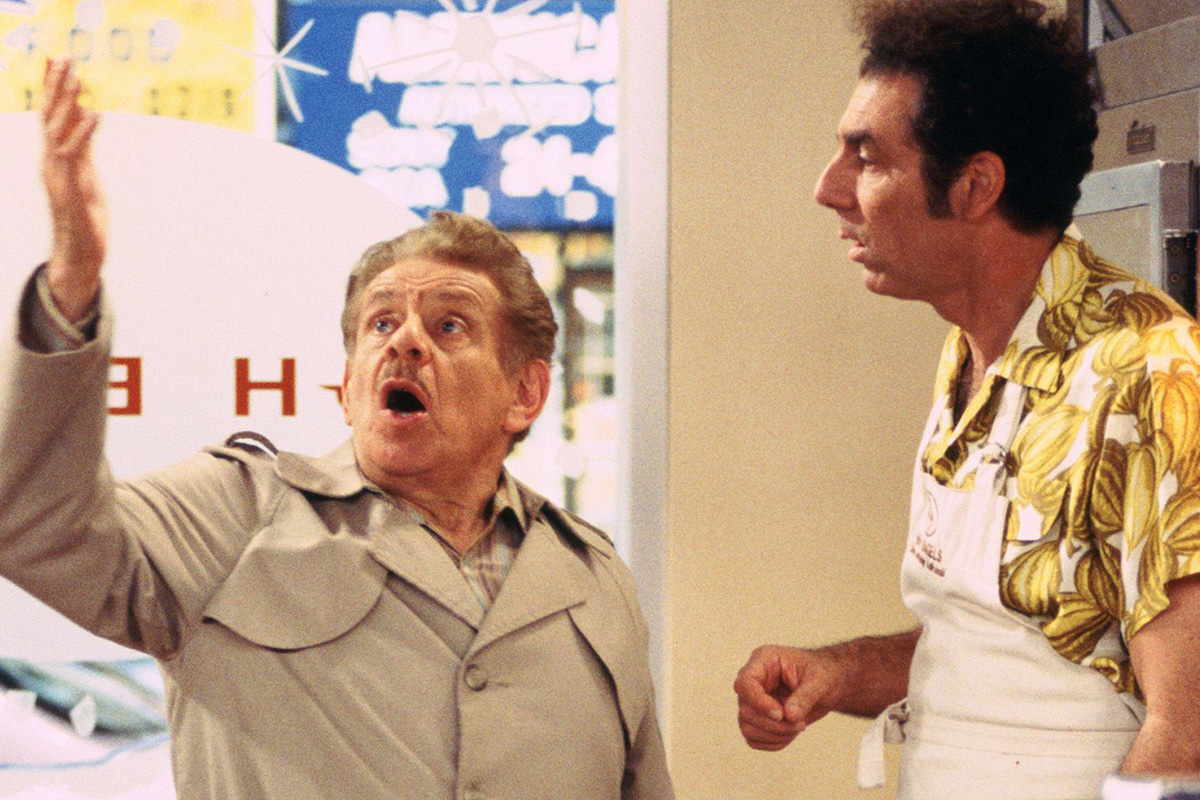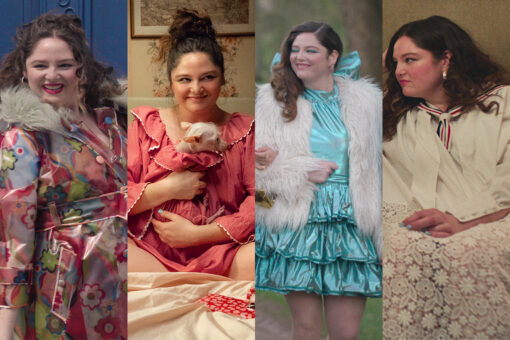I’ve never opened presents from Santa under a Christmas tree or sipped eggnog in an ugly Christmas sweater, but that week is still pure magic to me. Growing up as a Jewish kid, I used to feel left out, overlooked — but as I’ve gotten older, I’ve realized the final days of December are packed with plenty of special traditions that actually make me feel more deeply connected to Jewish culture.
Obviously, the big one is eating Chinese food on Christmas. The tradition originated at the turn of the last century when Jewish and Chinese immigrants lived side by side in lower Manhattan. Jews wouldn’t eat in most Christian-owned restaurants because they weren’t kosher, but Chinese cuisine rarely mixes meat and dairy, so it was a safer choice. Another tradition is the annual pilgrimage of Jewish children visiting their snowbird grandparents in Boca over winter break. And then there’s the Matzo Ball, the Jewish singles’ dance held every Christmas Eve in dozens of cities across the country. My parents actually met at the inaugural Ball in 1987, and while I don’t love shimmying into a cocktail dress in 15-degree weather in order to half-heartedly attempt to meet my future husband, I do it anyway. It’s tradition.
Finally, there’s Festivus. The holiday is best known for appearing in an iconic 1997 episode of “Seinfeld.” The story goes that Frank Costanza (played beautifully by a very grumpy Jerry Stiller) invented the tradition as a rebellion against the religious hub-bub and rampant consumerism of the holiday season. There’s an aluminum pole instead of a Christmas tree, a father-son wrestling match called the Feats of Strength, and a ritual called the Airing of Grievances, where you gather your loved ones around the table for a special meal and yell about all the ways they’ve disappointed you over the past year. If anything surprising happens, it’s chalked up to being a “Festivus miracle.”
But Festivus actually predates “Seinfeld.” It was created in 1965 by a man named Daniel O’Keefe Sr. The first celebration was held in February to mark his wedding anniversary. Throughout the ‘60s, ‘70s and ‘80s, the O’Keefe family celebrated Festivus every year, sometimes in May, sometimes in October. The hallmarks of their celebrations weren’t quite like what we saw on TV, but they were delightfully quirky all the same.
Daniel O’Keefe Jr. grew up to become a writer for “Seinfeld.” His coworkers found out about his family’s unusual tradition and thought it deserved an episode — a holiday special, if you will — but O’Keefe actively fought against it. He was mortified by it. But Jerry Seinfeld liked it, so it stuck. Fans still celebrate it every year on December 23.
While the O’Keefe family is Irish-Catholic and the Costanza family sounds Italian, I’m claiming Festivus as an iconic culturally Jewish touchstone. It mirrors the classic Jewish experience of feeling othered on Christmas, and given Jerry Seinfeld’s own roots, the show has gained a cult following among members of the tribe. If you still have any doubts, just look at every fiber of Frank Costanza’s being. Can you honestly tell me that’s not a Jewish grandfather?
I grew up in a household where “Seinfeld” was essentially like a religion. We didn’t celebrate Festivus, but the show was on all the time. My dad trained me and my sister Julia from the time we were young to say “you’re sooo good-looking” instead of “bless you” when someone sneezes, because as they say on the show, nobody feels attractive after a sneeze. A portrait of Kramer hangs in my parents’ house, and every member of my family owns matching shirts with George Costanza’s face on them.
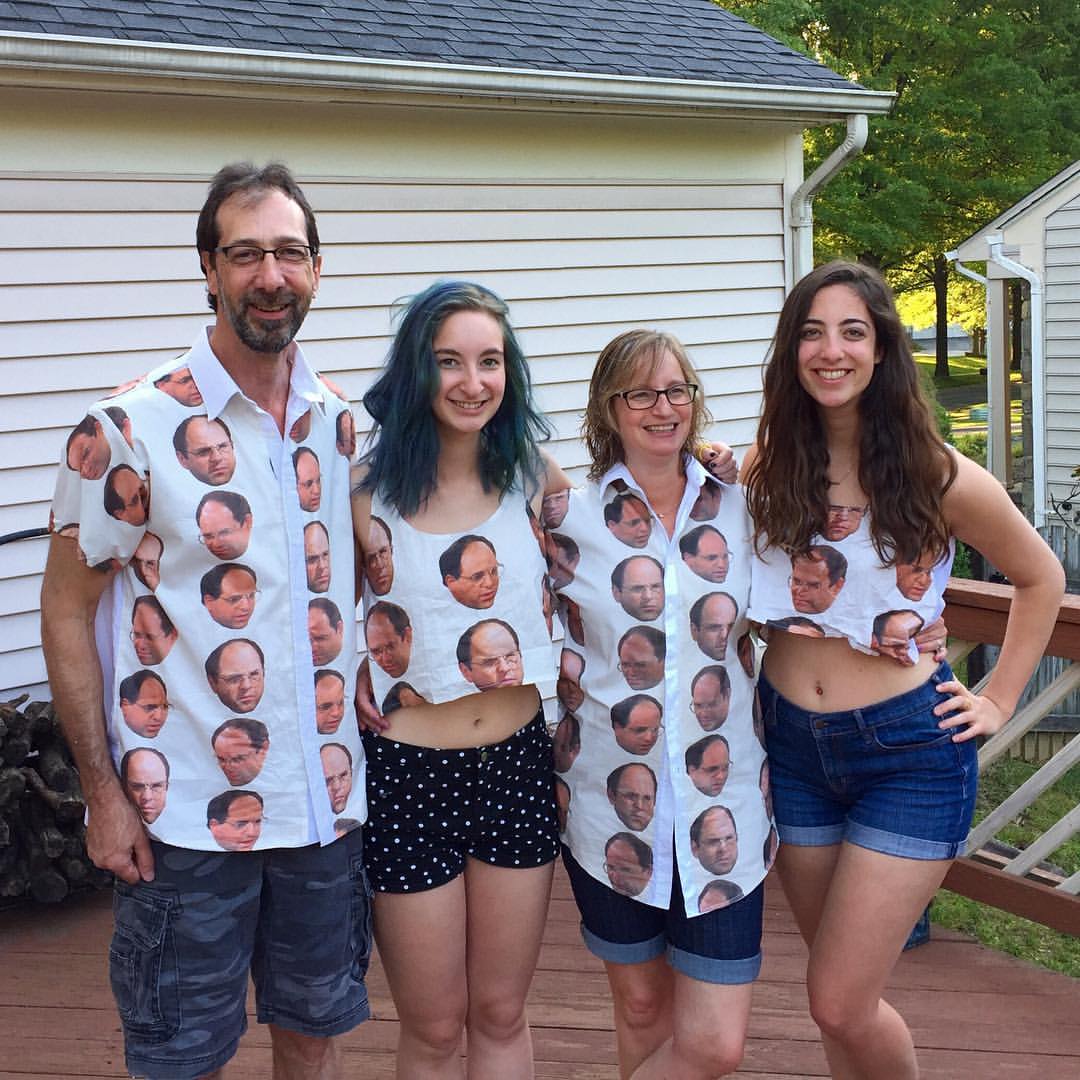
On December 23, 2019 — Festivus — I was a disaster. One month prior, I had left the apartment I shared with my boyfriend to get us breakfast. When I returned 20 minutes later, he dumped me — suddenly, shockingly, brutally — while sipping the latte I had just bought for him. He left that day. I never saw him again.
After that, I couldn’t eat, I couldn’t sleep, I couldn’t walk down the block without bursting into tears. My trust was shattered; I felt abandoned and adrift. Everyone told me that time heals all wounds, but I had never felt so hopeless in my life. I couldn’t imagine how I’d get to that brighter future.
(A quick side note, if I may — it’s worth noting that there was only one thing about my ex that my dad ever admitted to disliking while we were together: He refused to join in our standard response to a sneeze. It’s a silly, harmless tradition, and it would have cost him nothing to score major brownie points with my family. In hindsight, my dad was right.)
Julia had flown in from Austin for the weekend and wanted to cheer me up. She insisted that happiness would be just around the corner for me, and she was going to prove it by planning the perfect fun night. She suggested going to dive bars, or eating an entire wedge of truffle cheese, or killing a bottle of wine while watching videos of adorable kittens on YouTube. But then, I spotted an Instagram post from a restaurant called Niche Niche advertising a Festivus dinner party. It would be a true “Festivus for the rest of us,” the holiday’s slogan.
I raced to the restaurant’s website to reserve a table for two, but the dinner was completely sold out. In a last-ditch attempt, I sent the restaurant a wildly desperate DM begging for two seats, sending a photo of my family in the shirts, asking, “Is there any chance you could squeeze us in?” Minutes later, there was a reply. “Lolz sure.” With a Z. L-O-L-Z. We were in! A Festivus miracle. I ironed my Costanza crop top and off we went.
Niche Niche is not quite a regular restaurant. It’s a wine bar-slash-dinner party held in a West Village townhouse and there’s a different resident sommelier every night. The menu changes daily to complement the wine. The space is dimly lit with wine bottles covering every flat surface. It’s decorated with groovy colorful furniture, brown tile and string lights, so you kind of feel like some 1970s swingers invited you to their basement.
Upon our arrival, we were each handed a glass of white wine, the first of four that would be served that night. We had great seats, right by the Festivus pole. The menu included smoked salmon, latkes with caviar, little gem salad, roast chicken with carrots and chocolate custard for dessert. There was even a pupu platter (I told you, Festivus is low-key Jewish, it’s the whole Chinese food on Christmas thing). Each new glass of wine was more delicious than the last. I used to think I hated rosé, but I was introduced to this funky bottle made in the mountains of Spain — less fruit-forward, more acidic, very tasty. I was sold.
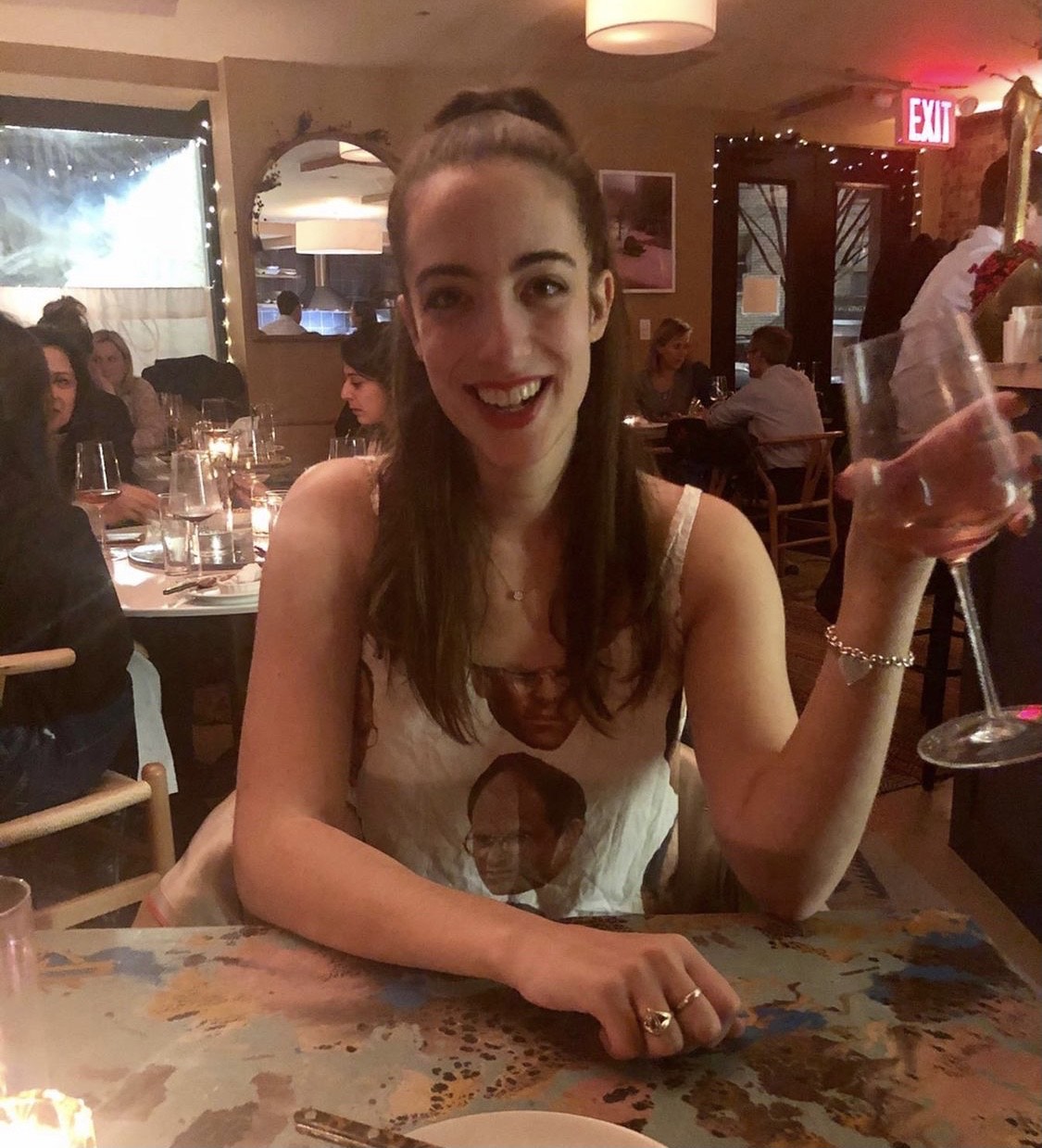
While we ate and drank, we prepared for the airing of grievances by making lists of things that had upset us that year. I didn’t want to write about my breakup, so instead, we complained about the hairdresser who went rogue and decided I should have bangs and the time I got scammed by a moving company and was physically unable to exit Manhattan for Brooklyn. Then, we all read our grievances out loud and voted for the worst ones. Whoever had the biggest grievance would win a special bottle of wine. This was in 2019, so the most upsetting story involved a skirmish with JetBlue’s customer service department. (We were all so young.)
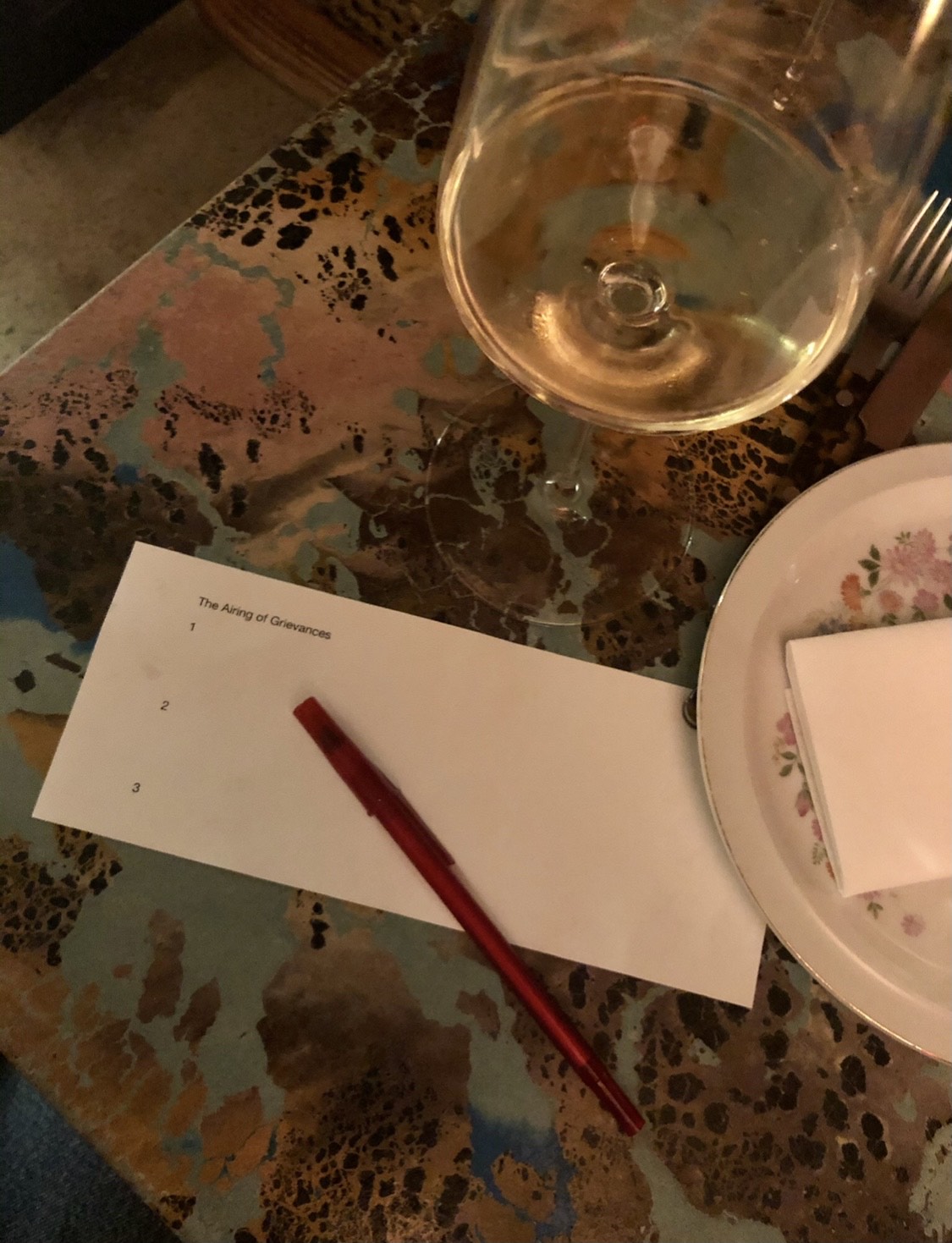
The rest of the night was a dream. After dinner, I discovered that the restroom was wallpapered floor to ceiling with photos of adorable dogs — Pomeranians, German Shepherds, goldendoodles galore. What a fantastic surprise. Upon leaving, Julia and I wandered over to Marie’s Crisis, the piano bar, and stayed just long enough to remember that we both hate showtunes. During our cab ride home, we made plans to watch the Festivus episode before bed.
As we drove over the Williamsburg Bridge, lit up and glittering with the majestic Manhattan skyline behind us, it hit me that for the first time in a month, I was really, truly, blissfully happy. It wasn’t just the fun night out — it was that I finally saw the light at the end of the tunnel. It sunk in that there would be plenty of joy and magic and love in store for me, especially if I leaned on my friends and family during the darkest days. My heart still felt shattered, but in that moment, I knew that things would eventually be OK. It was a Festivus miracle.
